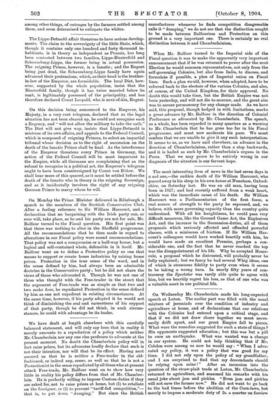Tile most interesting item of news in the last seven
days is a sad one,—the sudden death of Sir William Harcourt, who passed away in his sleep in his own house at Nuueham, Oxford- shire, on Saturday last. He was an old man, having been born in 1827; and had recently suffered from a weak heart, which was the immediate cause of his death. Sir William Harcourt was a Parliamentarian of the first force, a real source of strength to the party he espoused, and, we believe, with more governing capacity than the country quite understood. With all his haughtiness, he could pass very difficult measures, like the Ground Game Act, the Explosives Act, and the increase in the Succession-duties, all of them proposals which seriously affected and offended powerful classes, with a minimum of friction. If Sir William Har- coart's colleagues would have worked heartily with him, he would have made an excellent Premier, perhaps a con- siderable one, and the fact that he never reached the top was the disappointment of his life. Why he accepted Home- rule, a proposal which he distrusted, will probably never be fully explained; but we fancy he had several Whig ideas, one of which is strenuous fidelity to party even when it seems to be taking a wrong turn. In nearly fifty years of con- troversy the Spectator was rarely able quite to agree with him, but we heartily regret his loss, as that of one who was a valuable asset in our political life.










































 Previous page
Previous page